The 10 Best Dehydrated Dog Foods in 2026

Our dogs deserve the best when it comes to nutrition and quality food. We want our canine pals to be with us for the long haul, so to ensure they stay in optimum health we need to feed them well. While the most common types of foods are dried kibble or canned meat, there are many dehydrated options that are healthy, and above all, tasty!
While dehydrated foods provide many benefits, choosing the right kind can be challenging if you’re new to this style. To help you out, we’ve compiled our top 10 favorite dehydrated dog foods and what benefits they provide.
- What You Need to Know About Dehydrated Dog Food
- Top 10 Best Dehydrated Dog Foods 2026
- 1. Best Overall Dehydrated Dog Food: Stella & Chewy's Freeze-Dried Raw Dinner Patties
- 2. Best Budget Dehydrated Dog Food: The Honest Kitchen Dehydrated Organic Whole Grain Dog Food
- 3. Best Vegetarian Dehydrated Dog Food: Dr. Harvey's Canine Health Miracle Dog Food
- 4. Best Gluten-Free Dehydrated Dog Food: Sojos Complete Freeze-Dried Grain-Free Dog Food
- 5. Best Premium Dehydrated Dog Food: Addiction Grain-Free Dehydrated Dog Food
- 6. Best Dehydrated Dog Food for Digestion: K9 Natural Freeze-Dried Dog Food Booster
- 7. Best Smelling Dehydrated Dog Food: Spot Farms Natural Dehydrated Dog Food
- 8. Best Tasting Dehydrated Dog Food: Wellness Core Air-Dried Grain Free Dog Food
- 9. Best Dehydrated Dog Food for Picky Eaters: Primal Freeze-Dried Dog Food
- 10. Simplest Ingredients: "I and love and you" Stir & Boom Raw Dog Food Topper
- Guide to Buying the Best Dehydrated Dog Food
- Final Thoughts
What You Need to Know About Dehydrated Dog Food
Dehydrated dog food comes in a variety of sizes and formats (and tastes!) and they also vary depending on ingredient quality. Below we’ve provided information about what dehydrated dog food is and how to select the best kind for your pet.
What Is Dehydrated Dog Food?
Dehydrated dog food is minimally processed food that has had the moisture removed. Drying retains the nutritional quality of the ingredients while also preserving their flavors and aromas, making it highly palatable. Therefore, dehydrated food is nutrient-dense and similar to raw food, but without the moisture.
Types of Dehydrated Dog Food
While ‘dehydrated’ is an umbrella term for food that’s been dried, there are differences in preparation that are worth mentioning.
Air-Dried
Air-dried food is made by — you guessed it—circulating air to slowly dry out the food. This method retains the nutrients due to the gentle processing involved.
Freeze-Dried
With freeze-dried food, all the moisture is removed once the ingredients are frozen. This involves a strong vacuum with a slightly raised temperature that causes the water to evaporate.
Dehydrated
Dehydrated food is exposed to a gentle heat to extract moisture. This heat processing is done at low temperatures to maintain the nutrients in the ingredients.
What to Look for in Dehydrated Dog Food
In general, the nutrient quality that results from the three dehydrated methods is the same. There are also other things to consider when choosing this food type ranging from quality to convenience.
Ingredient Quality
Many dehydrated foods contain an abundant list of wholesome ingredients. Be on the lookout for natural and organic vegetables and grains, as well as meat that is grass-fed or free-range. It’s also worth looking for foods that have an array of vitamins, minerals, probiotics, and even taurine, which is good for eye and heart health.
We explain more about the primary ingredients in dehydrated dog foods and their benefits at the bottom of this article.
Health Benefits
It’s no secret that nutrient-dense food provides health benefits for your pooch. A power-packed meal will leave your dog feeling fuller which helps with weight maintenance. Be sure to check the ingredients for the percentages of protein, fat, fiber, and moisture in the product since dogs require adequate protein, vitamins, minerals, and fats for energy and strong health.
More detail about the health benefits of dehydrated dog food can be found at the end of this article.
Ease of Preparation
Another benefit of dehydrated food is convenience. Dehydrated food is lightweight and easy to prepare since you only need to add warm water. While pouring kibble out of a box is certainly the fastest method, dehydrated food only takes a few minutes.
However, some dehydrated food can take longer in terms of rehydration time, so be sure to read the instructions before making your purchase. Another thing to look out for is the moisture content as it will give you an idea of how dry the product is.
Having briefly covered the benefits of dehydrated dog food, let’s review the best ones available and why we like them.
Top 10 Best Dehydrated Dog Foods 2026
1. Best Overall Dehydrated Dog Food: Stella & Chewy's Freeze-Dried Raw Dinner Patties
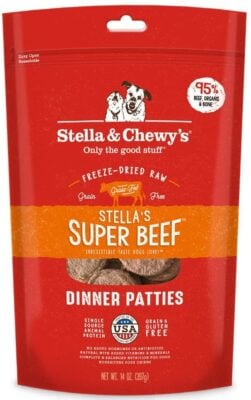
Editor’s Rating:
Why we like it: Stella & Chewy’s dehydrated dog food patties have a high meat content and are 100% natural and organic.
Quick Facts
- Drying Method: Freeze-Dried
- First Five Ingredients: Beef, Beef Liver, Beef Kidney, Beef Heart, Beef Tripe
- Flavor: Beef
- Quantity: A 14 oz Bag Contains 32 Patties (A 10 lb. Dog Needs About 4 Patties/Day)
- Nutrient Analysis: Protein (Min) 44.0%; Fat (Min) 35.0%; Fiber (Max) 5.0%; Moisture (Max) 5.0%
At the top of our list is this dehydrated dog food from Stella & Chewy’s. Containing all-natural ingredients, these patties are high in protein and come in a wide variety of flavors.
Quality of Ingredients
Made in the USA, these patties are 95% meat and are gluten- and grain-free. The primary ingredients are grass-fed beef, organic cranberries, spinach, broccoli, beets, carrots, and squash. It also contains vitamins E, D3, and B12, as well as copper, folic acid, and selenium. This product is also free from hormones, fillers, and antibiotics.
Health Benefits
The raw, grain-free recipe of this food makes it easier to digest, especially as it contains few ingredients that typically cause sensitivity. The patties are enhanced with probiotics for gut health, and with taurine, which aids eye and heart health.
Other Benefits
Stella & Chewy’s is suitable for dogs of all ages, although puppies may need more patties for additional nutrients. It can be served as is, as a topper for added nutrients, or rehydrated as a main meal. The high meat content also makes it palatable for picky eaters, which can make it worth the relatively high cost.
Ease of Preparation
These patties are simple to prepare as they can be served whole or crumbled and rehydrated.
Pros
- 11 different flavors
- High meat content
- Natural and organic ingredients
- Can be served in three different ways
Cons
- A bit pricey (especially if only used as a main meal)
2. Best Budget Dehydrated Dog Food: The Honest Kitchen Dehydrated Organic Whole Grain Dog Food
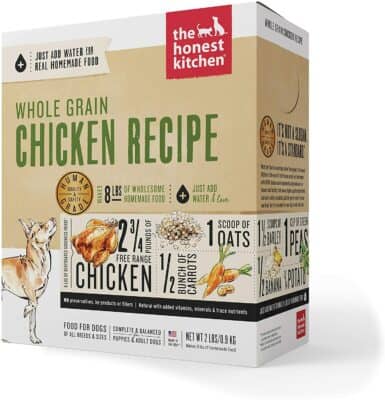
Editor’s Rating:
Why we like it: This all-natural human-grade dog food contains a high-quality blend of ingredients that are reminiscent of a roast chicken dinner.
Quick Facts
- Drying Method: Dehydrated
- First Five Ingredients: Dehydrated Chicken, Organic Barley, Dehydrated Potatoes, Organic Flaxseed, Organic Oats
- Flavor: Chicken
- Quantity: A 10 lb. Bag Makes 40 lbs. of Dog Food
- Nutrient Analysis: Protein (min) 24.5%; Fat (min) 14.0%; Fiber (max) 4.0%; Moisture (max) 8.0%
Our budget pick is this dehydrated food from Honest Kitchen. It contains organic grains, free-range meat, and high-quality ingredients that are healthy and energizing.
Quality of Ingredients
This product is made in the USA with human-grade, all-natural ingredients such as free-range chicken, potatoes, carrots, bananas, peas, celery, oats, barley, and flaxseed. It also has taurine, vitamins B1, B2, B12, D3, and minerals from dehydrated kelp. There are also no fillers, preservatives, or GMO ingredients, and no allergen grains like wheat, corn, or soy.
Health Benefits
Honest Food’s high-quality ingredients make it nutrient-dense and it doesn’t contain fillers, which helps maintain a healthy weight. This food is also easily digestible due to the fine dicing of the ingredients and the gentle dehydration process.
Other Benefits
Honest Kitchen is good value for money compared with other products of its kind, although if you are looking for a premium option, check out Addiction’s Dehydrated Dog Food. While the formula and quality were changed and are not as impressive as they used to be, this is still a solid option.
This food is also suitable for dogs of all ages and breeds, but its higher calorie and protein content are aimed at active pooches.
Ease of Preparation
Preparing this food is simple as it only requires 3 minutes to rehydrate with warm water.
Pros
- Natural and organic ingredients
- Comes in 3 flavors
- Convenient and easy to make
- Made in a human-grade facility
Cons
- The formula and quality have changed
3. Best Vegetarian Dehydrated Dog Food: Dr. Harvey's Canine Health Miracle Dog Food
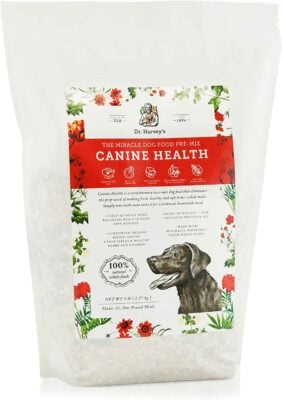
Editor’s Rating:
Why we like it: Dr. Harvey’s dehydrated mix contains a low-protein blend of vegetables, herbs, and organic grains, making it a healthy starter base for your dog’s dinner.
Quick Facts
- Drying Method: Dehydrated
- First Five Ingredients: Organic Rolled Oats, Organic Barley, Organic Triticale, Organic Spelt, Organic Brown Rice
- Flavor: Vegetable
- Quantity: A 5 lb. Bag Makes 33 lbs. of Dog Food
- Nutrient Analysis: Protein (Min) 12.0%; Fat (Min) 3.0%; Fiber (Max) 5.0%; Moisture (Max) 12.0%
This blend of grains and vegetables is minimally processed and makes an excellent base that can be combined with meat or a protein topper like K9’s Freeze-Dried Booster for a well-rounded meal.
Quality of Ingredients
Dr. Harvey’s contains 6 organic whole grains, 9 vegetables and herbs, and crushed eggshells for added calcium. It is rich in zinc, iron, manganese, riboflavin, folic acid, and vitamins E, A, D, B12, and D3. It is made in the USA, is non-GMO, and doesn’t contain fillers, preservatives, or allergen grains like corn, wheat, or soy.
Health Benefits
The calcium and vitamin D in this food contributes to healthy bones, while the vitamin density and fiber contents are excellent for digestion. This vegetarian blend also uniquely supports dogs with kidney disease due to its lesser amounts of protein and phosphorous.
Other Benefits
This product has a pleasant smell due to the distinct mix of herbs, vegetables, and grains, making it palatable for picky eaters. This food is also suitable for dogs of all ages.
Ease of Preparation
This mix is easy to rehydrate, although prep time is longer if you are adding other ingredients.
Pros
- Pleasant smell
- Good for kidney support (low protein)
- Organic ingredients
- Good value for money
Cons
- Requires extra preparation time to add other ingredients
4. Best Gluten-Free Dehydrated Dog Food: Sojos Complete Freeze-Dried Grain-Free Dog Food
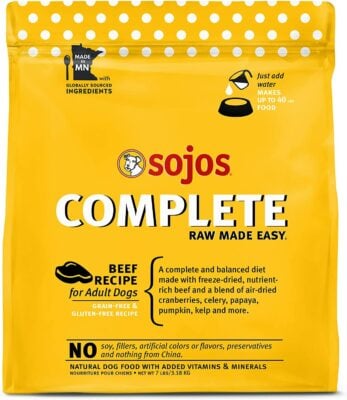
Editor’s Rating:
Why we like it: Sojos’ freeze-dried dog food is like beef stew and provides a healthy balanced meal that is free from gluten.
Quick Facts
- Drying Method: Freeze-Dried
- First Five Ingredients: Beef, Sweet Potatoes, Carrots, Whole Egg, Cabbage
- Flavor: Beef
- Quantity: A 7lb. Bag Makes 40lbs of Dog Food
- Nutrient Analysis: Protein (Min) 25.0%; Fat (Min) 14.0%; Fiber (Max) 5.5%; Moisture (Max) 10.0%
Sojos’ food is ideal for pet owners that want to avoid grains and gluten and are looking for whole, natural ingredients. Comparable gluten-free options on this list include Wellness Core’s Air-Dried Topper and Primal’s Freeze-Dried Nuggets.
Quality of Ingredients
All the ingredients in this product are made in the USA, and primarily consist of beef, flaxseed, carrots, cabbage, celery, papaya, cranberries, ginger, and kelp. It also has vitamins D and E, copper, calcium, riboflavin, and folic acid. The ingredients are human-grade, non-GMO, and contain no fillers, preservatives, or additives.
Health Benefits
Sojos’ food provides numerous health benefits, such as healthy fur, due to the fats and the omega oils. It also promotes immunity, healthy weight, and digestion due to the whole foods that have been gently air-dried. Its lack of gluten is also great for dogs with grain allergies.
Other Benefits
The blend of ingredients in this food creates a very pleasant smell, which is great for picky eaters. Sojos is also aimed at adult dogs.
Ease of Preparation
Preparation is simple, although this product’s rehydration time of 15 minutes is longer than some of the others on this list.
Pros
- Boosts immunity
- Easy to prepare
- High-quality natural ingredients
- Grain-free
Cons
- Rehydration time takes longer than comparable products
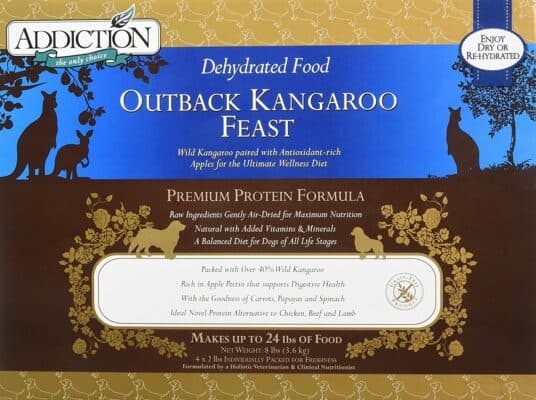
Editor’s Rating:
Why we like it: This dehydrated dog food comes with a hefty price tag, but it is offset by its unique and tasty kangaroo flavor.
Quick Facts
- Drying Method: Dehydrated
- First Five Ingredients: Kangaroo, Potatoes, Carrots, Canola Oil, Tapioca
- Flavor: Outback Kangaroo
- Quantity: An 8lb. Box Makes 24 lbs. of Dog Food
- Nutrient Analysis: Protein (Min) 21.0%; Fat (Min) 10.0%; Fiber (Max) 6.0%; Moisture (Max) 12.0%
This grain-free dehydrated food from Addiction is made from 40% wild kangaroo, providing a novel form of protein for your pooch. Its all-natural ingredients are responsibly sourced and packed with nutrients for a unique type of food.
Quality of Ingredients
Addiction’s product is specially formulated for digestive health, thanks to its inclusion of apple pectin. Along with kangaroo, its primary ingredients are potatoes, carrots, papayas, apples, and spinach, and it is supplemented with vitamins E, B1, B3, B5, B6, and B12, and minerals like niacin, riboflavin, calcium, and copper. This food is free from grains, fillers, wheat, and soy.
However, this food does contain controversial ingredients like Brewer’s dried yeast and flaxseed. Brewer’s can cause allergies, and flaxseed isn’t always easily digestible by dogs (although our research has found that flaxseed is a common ingredient in dehydrated food).
Health Benefits
Wild kangaroo is known as lean and nutritious muscle meat, due to its high levels of iron and amino acids. This product’s inclusion of apples also boosts its antioxidant content for optimal digestion, and linoleic acid promotes healthy skin and coat.
Other Benefits
This blend is suited to dogs of all ages. Also, the gentle processing retains much of the original nutritional content and aroma, making it a palatable choice for picky eaters.
Ease of Preparation
Preparation is easy since adding water is optional. It can also be mixed with other food.
Pros
- High nutritional content
- Unique flavor
- A lean source of protein
- Excellent health benefits
Cons
- Contains some controversial ingredients
6. Best Dehydrated Dog Food for Digestion: K9 Natural Freeze-Dried Dog Food Booster
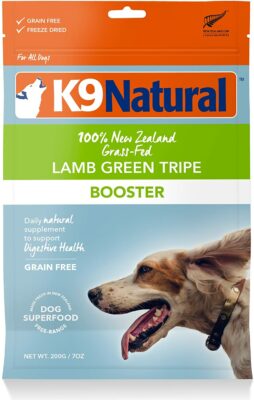
Editor’s Rating:
Why we like it: K9’s freeze-dried supplement is a tasty superfood that boosts the nutrient profile of your dog’s food.
Quick Facts
- Drying Method: Freeze-Dried
- First Five Ingredients: Lamb green tripe
- Flavor: Lamb
- Quantity: 7 oz. Bag (Topper Recommendation is ½ Cup/Day for a Medium-Sized Dog Weighing 23-55lbs)
- Nutrient Analysis: Protein (Min) 60.0%; Fat (Min) 18.0%; Fiber (Max) 2.4%; Moisture (Max) 8.0%
This booster product from K9 contains green tripe, which is essentially the untreated contents of a lamb’s stomach. Due to its high content of enzymes and good bacteria, lamb green tripe is a superfood for dogs and makes a fantastic addition to your pet’s meals.
Quality of Ingredients
This tripe originates from New Zealand and comes from 100% grass-fed animals. The freeze-drying retains the nutrients, and it is high in protein, amino acids, probiotics, and digestive enzymes. This product is non-GMO and doesn’t contain fillers, binders, or preservatives. It is also gluten-free.
Health Benefits
Because of its digestive enzymes and probiotics, this product primarily benefits digestion and immunity. Its high protein content and essential fatty acids are also good for energy and healthy skin, muscles, and cartilage.
Other Benefits
While this product can be smelly, the flavor is quite palatable to dogs — even those that are picky eaters. It is also best suited to adult dogs.
Ease of Preparation
This food requires no preparation. Simply sprinkle the desired amount over your dog’s food or give it to them as a treat.
Pros
- Easy to use (just sprinkle)
- Contains digestive nutrients
- Natural ingredients
- Excellent source of protein
Cons
- The smell can be off-putting
7. Best Smelling Dehydrated Dog Food: Spot Farms Natural Dehydrated Dog Food
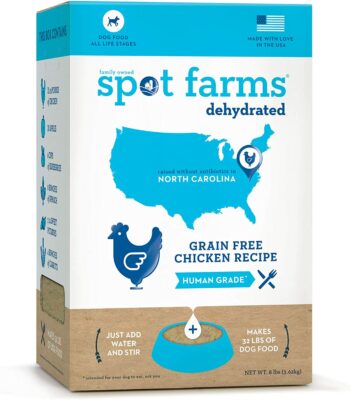
Editor’s Rating:
Why we like it: This chicken flavored food smells great and contains probiotics to aid digestion.
Quick Facts
- Drying Method: Dehydrated
- First Five Ingredients: Dehydrated Chicken, Dried Potatoes, Flaxseed, Dried Apples, Dried Carrots
- Flavor: Chicken
- Quantity: An 8lb. Box Makes 32 lbs. of Dog Food
- Nutrient Analysis: Protein (Min) 26.0%; Fat (Min) 16.0%; Fiber (Max) 5.0%; Moisture (Max) 10.0%
Spot Farms’ dehydrated food contains natural, high-quality ingredients that give it a fantastic smell. If your doggie likes chicken, you may also want to check out Honest Kitchen’s Dehydrated Organic Food.
Quality of Ingredients
This human-grade mix is made in the USA and its primary contents are free-range chicken, fish oil, spinach, potatoes, apples, blueberries, and sweet potatoes. It also contains probiotics, manganese, zinc, iron, selenium, copper, calcium, riboflavin, vitamins D3, and B12. Spot Farms has no additives, antibiotics, or preservatives, although they are not certified as GMO-free.
Health Benefits
The high protein and oil content in this food help maintain healthy tissues, fur, and skin. This formulation is also good for digestion owing to the whole foods and probiotics.
Other Benefits
Some of the larger chunks of fruit and veg in this product can put off pickier eaters. It has a very pleasant aroma, though, which can outweigh the larger food chunks! It is also suitable for dogs of all ages.
Ease of Preparation
The preparation of this food is easy and requires only a few minutes of rehydration. The consistency can be a bit porridge-like which may not suit all tastes, though.
Pros
- High-quality ingredients
- Uses cage-free chickens
- Good for digestion
- Easy to prepare
Cons
- Not certified as GMO-free
- Some of the fruit and veg pieces are large, affecting palatability
8. Best Tasting Dehydrated Dog Food: Wellness Core Air-Dried Grain Free Dog Food
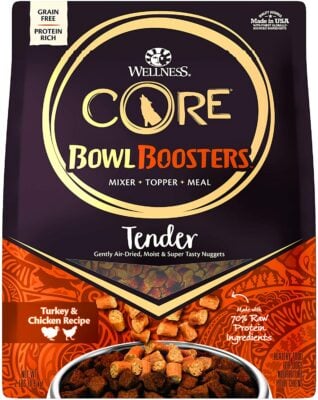
Editor’s Rating:
Why we like it: Wellness Core’s air-dried food has an excellent flavor and makes a great grain-free topper for your pet’s meals.
Quick Facts
- Drying Method: Air-Dried
- First Five Ingredients: Deboned Turkey, Deboned Chicken, Chickpeas, Peas, Gelatin
- Flavor: Turkey & Chicken
- Quantity: 2 lb. Bag (Topper Recommendation is ¼ Cup/Day for a Medium-Sized Dog Weighing 21-40 lbs)
- Nutrient Analysis: Protein (Min) 31.0%; Fat (Min) 21.0%; Fiber (Max) 3.0%; Moisture (Max) 20.0%
This topper from Wellness Core is air-dried and 100% natural, making it a good add-on to your dog’s meal. It doesn’t require rehydration and is great for providing supplemental nutrients and textures.
Quality of Ingredients
These soft bits are made from 70% protein ingredients and are grain- and gluten-free. Its main contents are turkey, chicken, flaxseed, chickpeas, chicory root, kale, parsley, broccoli, spinach, and tomato pomace (a byproduct of tomato manufacturing). It also contains copper, zinc, vitamins A, C, D3, and B12, folic acid, and herbal extracts such as rosemary, green tea, and spearmint. It is made in the USA, is non-GMO, free from wheat, soy, and corn, and contains no additives or artificial flavors.
It’s worth noting, though, that tomato pomace is a controversial ingredient with a reputation for low digestibility and low nutrient value. Also, ‘natural flavor’ on the ingredient list is vague and seems to serve no clear purpose.
Health Benefits
The high amount of protein in this topper contributes to healthy energy levels and shiny coats. It also has adequate carbohydrates and fiber content, making it good for digestion and weight maintenance.
Other Benefits
This product’s high meat content makes it desirable for dogs’ palates. It can be served as a treat or sprinkled on top of other food. It is also good for dogs of all ages.
Ease of Preparation
Preparing this food is easy and requires no rehydration. Simply sprinkle it on top of your dog’s meal and let them enjoy it.
Pros
- Soft and tender texture
- High protein content
- Excellent taste
- Grain-free
Cons
- Contains tomato pomace, a controversial ingredient
- ‘Natural flavor’ on the ingredient list is vague and unhelpful
9. Best Dehydrated Dog Food for Picky Eaters: Primal Freeze-Dried Dog Food
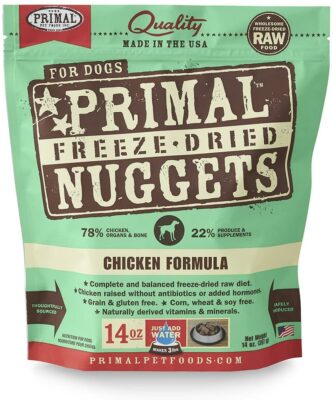
Editor’s Rating:
Why we like it: Primal’s natural freeze-dried nuggets are grain-free and contain a good nutritional balance.
Quick Facts
- Drying Method: Freeze-Dried
- First Five Ingredients: Chicken, Chicken Necks, Chicken Gizzards, Organic Kale, Organic Carrots
- Flavor: Chicken
- Quantity: A 14 oz. Bag Makes 3 lbs. of Dog Food
- Nutrient Analysis: Protein (Min) 37.0%; Fat (Min) 37.0%; Fiber (Max) 1.0%; Moisture (Max) 2.0%
Primal’s freeze-dried nuggets can be used as a topper, supplement, or as a meal, making the prep similar to Stella & Chewy’s Freeze-Dried Patties. They are all-natural, rich in protein, and contain a decent balance of meat and produce.
Quality of Ingredients
The primary ingredients in these nuggets are chicken meat and organs, kale, carrot, yam, broccoli, apples, cranberries, organic parsley, coconut oil, and salmon oil, and pumpkin and sunflower seeds. They also contain minerals (zinc sulfate, copper carbonate, sodium selenite) and vitamin E. The nuggets are made in the USA, are free from wheat, soy, or corn, and contain no additives or hormones.
Health Benefits
The high amount of oils in these nuggets promotes energy and healthy fur. There is also a good balance of protein and natural vitamins and minerals, making it a good all-rounder for weight management and healthy digestion.
Other Benefits
Primal’s high chicken content and its blend of fruit and veg make this a palatable food choice for picky eaters. They are also suitable for canines of all ages.
Ease of Preparation
This product can be served as is, or you can break them apart (which can be hard to do) and add water to rehydrate.
Pros
- Can be used as a supplement or main meal
- Good fat content
- Good for healthy fur and coat
Cons
- A bit pricey
- Nuggets can be difficult to break apart
10. Simplest Ingredients: "I and love and you" Stir & Boom Raw Dog Food Topper
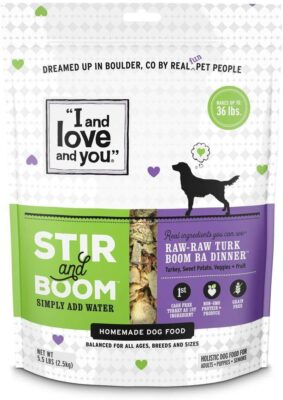
Editor’s Rating:
Why we like it: This homemade dog food contains superfoods and has a simple list of ingredients that is suitable for dogs of all ages and sizes.
Quick Facts
- Drying Method: Freeze-Dried
- First Five Ingredients: Turkey, Yellow Split Peas, Sweet Potato, Cabbage, Carrots
- Flavor: Turkey
- Quantity: A 5.5 Bag Makes 36 lbs. of Dog Food
- Nutrient Analysis: Protein (Min) 32.0%; Fat (Min) 9.0%; Fiber (Max) 5.0%; Moisture (Max) 10.0%
I and love and you’s turkey flavored food topper is all-natural, cooked in small batches, and contains ginger and kelp for added superfood nutrition.
Quality of Ingredients
This product contains a simple list of ingredients that includes turkey, split peas, sweet potato, dried egg, flaxseeds, banana, kelp, spinach, ginger, and zinc, copper, and vitamins E and D3. It is non-GMO, free from wheat, corn, and soy, and contains no artificial ingredients or fillers.
Health Benefits
This freeze-dried food has easy-to-digest carbs, thanks to the split peas and sweet potato, and is also high in vitamins and minerals.
Other Benefits
The milder scent and gentler ingredients in this food can make it a bit bland, but it has a palatable flavor. This product also states it is designed for all ages, but we found that Honest Kitchen, Addiction, and Spot Farms make comparable all-age formulas.
Ease of Preparation
Preparation is easy and requires a 1:2 ratio of food to water; however, this can be adjusted depending on how thick you want it.
Pros
- High nutritional profile
- Contains superfoods like kale, ginger, and flaxseed
- Has a simple ingredient list
Cons
- Low on meat-based protein
- Prices keep going up
Guide to Buying the Best Dehydrated Dog Food
Buying the right dehydrated dog food can take careful planning, especially if your dog has special needs. While many of the dehydrated dog foods on the market provide high-quality products, there are several elements to consider, such as your dog’s type, the ingredient quality, and the health benefits.
Why Buy Dehydrated Dog Food?
With the convenience of both kibble and canned food, you may be wondering why you would switch to dehydrated dog food. To determine whether this type is best for your pooch, consider whether high nutritional value is important (or needed). For example, is your dog lacking in energy? Do they need to lose weight? If so, dehydrated food is an excellent option because its high nutrient quality can help with these issues.
The Difference Between Raw, Kibble, Canned, and Dehydrated
Dog food can be prepared in many ways, but there are differences in quality and nutrients. Therefore, choosing the right dehydrated food requires knowing how it’s prepared so that you can make informed decisions.
Raw
Raw food certainly has its benefits from a nutrient standpoint, since it gives you autonomy over the contents of your dog’s meal. After all, nothing beats preparing your dog a healthy home-cooked meal with your loving hands. However, the downside of raw is that it can be expensive and require a lot of prep time. You also run the risk of contamination from pathogens like salmonella or E. coli.
Kibble
Kibble is one of the most popular dog food types on the market and is made by mixing wet and dry ingredients to form a dough. This is then cooked at high temperatures and cut into bite-sized pieces. While kibble can be good for your pup’s teeth due to its hardness, this type of grub often contains very little nutrients because it is highly processed. Commercial kibble can also contain fillers, additives, and preservatives which further reduces its nutrition.
Canned
Dogs love wet food, so another popular food is canned meat. While this is an effective and immediate source of protein, some canned foods contain as much as 75% water, which lessens the overall nutrient density. Canned food can also be expensive, especially if you need to feed your dog lots of it to make up for the high amounts of water.
Dehydrated
Dehydrated food, on the other hand, marries the best of convenience, nutrition, and quality. Many brands use high-quality natural ingredients, and most of the nutrition is maintained during the drying process. Dehydrated food also removes the risk of pathogen contamination as the drying process kills these bugs off.
What Kind of Dehydrated Food Do You Need?
If you’ve decided to go the dehydrated route, you’ll then need to choose which kind. As mentioned at the beginning of this article, this food type can be air-dried, freeze-dried, or dehydrated. While there are only slight differences in nutrient quality among these three methods, you may want to experiment and see if your dog notices any difference.
Can Any Dog Eat Dehydrated Dog Food?
Another thing to consider is your dog’s type. While the convenience and nutrition are bonuses to you, in the end, it’s your canine pal who needs to be on board. Below we cover a few of the characteristics to consider when it comes to pairing dehydrated food with your pet.
Puppies
Like human babies, puppies need an abundance of nutrition to help them grow into healthy, strong adults. Generally, puppies will benefit from the high nutrient density of dehydrated food, but it’s best to check the label to see whether the formulation is age specific. It’s also worth checking the percentages of protein, fat, and fiber to see if it meets your growing puppy’s needs.
Adults
Adult dogs will have varying nutritional needs, but dehydrated food is a good way to help them maintain immunity, a healthy weight, and energy stores into their senior years. Again, check the nutritional profile of the food to ensure it meets your dog’s requirements.
Seniors
Senior dogs can also benefit from dehydrated food, especially because its softness makes it easier to digest. Dogs in their golden years can require additional nourishment as they age and vets often advise that they eat foods that are lower in calories and higher in fiber and protein.
Picky Eaters
One of the main benefits of dehydrated dog food is that it retains much of the taste, aroma, and flavor of the original ingredients. This makes dehydrated food a highly palatable choice for dogs compared to its more processed counterparts. However, while dehydrated food may have great aromas, you may need to do some trial and error to see what flavors your dog prefers.
Dogs With Allergies
Like humans, dogs can have allergies to grains, vegetables, or meat proteins. Some dehydrated foods are gluten- and grain-free, so it’s worth considering these if your pooch is sensitive. Dehydrated food is usually all-natural without fillers or preservatives, so it is a better option for dogs with sensitivities. That said, it’s best to talk with your vet and read the ingredients when it comes to allergies.
Ingredient Quality of Dehydrated Dog Food
Ingredient quality makes a huge difference to the taste, aroma, and palatability of dehydrated food. Many manufacturers aim for natural ingredients, but they do vary in terms of the amounts of meat, fruit, vegetables, grains, and supplements that are included. Below is a list of some of the most common ingredients in dehydrated food and what to look out for.
Real Meat
Dogs are notorious meat lovers. And if your canine pal is especially partial to it, look for foods that contain decent amounts, especially ones that are responsibly sourced and grass-fed. One way to assess the meat quantity of the product is to read the first five ingredients.
Meat quality is also important for protein intake because it is essential for healthy cells, tissues, organs, hormones, and antibodies. However, some vets argue that dogs need a balance of both plant-based and meat-based protein. A good product for this is I and love and you’s Food Topper which uses turkey and split peas for protein.
Grains & Seeds
Most dehydrated foods contain a mix of grains such as oats, barley, spelt, and rice, as well as seeds such as flaxseed and sunflower seed. These provide fiber, carbohydrates, and oils to make a complete meal for your dog. However, for those with sensitivities or grain allergies, look for foods that are gluten-free and grain-free. Most brands also stay away from known allergens such as corn, soy, and wheat.
Fruits & Vegetables
Dehydrated dog foods usually contain a decent mix of fruits and vegetables which add additional palatability. Popular ingredients are bananas, papayas, cranberries, blueberries, sweet potatoes, peas, celery, broccoli, carrots, and kale. Fruit and vegetables provide a host of vitamins and minerals, especially as the drying process retains much of the nutrients.
Human-Grade Ingredients
Something you will often see on a dehydrated dog food label is ‘human-grade.’ This means all the ingredients are safe for human consumption and they have met federal and packaging regulations. While it seems strange to have anything but ‘human-grade’ quality, the truth is that many commercial brands contain additives or fillers which are not safe for humans.
Naturally Sourced
In terms of quality and nutrition, it’s also worth ensuring that some or all of the ingredients are natural and responsibly sourced. This includes free-range and grass-fed meat, and organic fruits and vegetables. This is important for ensuring your pooch gets the very best in natural and nutrient-rich food.
What to Avoid
And finally, when choosing dehydrated food, you’ll want to ensure that the product doesn’t contain any nasties. Our research has shown that most dehydrated food manufacturers avoid these, but if in doubt, make sure the food is non-GMO, and doesn’t contain fillers, additives, preservatives, hormones, or artificial flavors.
Health Benefits of Dehydrated Dog Food
Another feature to consider when buying dehydrated dog food is the health benefits. After all, you want your pooch to be profiting from this new food choice in terms of improved well-being.
Digestion
Digestion can be enhanced in dogs through increased fiber and probiotics. Dehydrated food often contains good amounts of fiber, especially if its fruit and vegetable contents are high. Some producers also add probiotics, which gives your dog healthy gut bacteria. K9’s Freeze-Dried Food Booster, for example, is full of digestive enzymes and probiotics.
Healthy Fur & Coat
An intake of oils and fats will help your dog’s coat stay shiny and healthy. When assessing a dehydrated dog food with good fat content, check the nutritional analysis as the product will provide the percentage. Stella & Chewy’s Freeze-Dried Patties and Primal’s Freeze-Dried Nuggets, for instance, have high amounts of fat because they contain organ meat and bone marrow.
Weight Loss
Dogs can put on weight through a combination of poor diet, overfeeding, and lack of exercise. When it comes to dehydrated dog food, one of its primary benefits is nutrient density, meaning that it helps with satiety. Many commercial foods contain fillers, sugars, and other additives that can be less satiating and cause your pet to gain weight.
Making Your Choice
So, now that you have become familiar with the benefits and types of dehydrated dog food, it’s time to make your choice. This will come down to a few additional considerations, which we outline below.
Price
Dehydrated food is slightly expensive and comparable to higher-end kibble. However, another thing to consider is how much food you get. Most producers indicate how many pounds of food you get per bag, and it’s worth doing the math as some foods tend to go farther for your buck than others.
For example, we found that Honest Kitchen comes in at the best value, producing 40 lbs. of dog food out of a 10lb. bag.
Type
As we mentioned earlier, dehydrated food is prepared by air-drying, freeze-drying, or dehydrating. While the consistency and quality of these methods are similar, they all vary in terms of ingredient proportion, and how they cut up the components. You also want to decide what you want in terms of protein, fat, and fiber content, or if you want the product to be gluten-free.
Convenience
Overall, dehydrated dog food is simple and practical to prepare, but there are slight differences. Some foods require breaking into pieces before adding water. Others require more rehydration time, so again, you’ll need to decide how convenient you need your dehydrated food to be.
Final Thoughts
Dehydrated dog foods are an excellent option for those seeking healthy, natural, and nutrient-dense meals for their pet. The gentle processing that dehydrated food goes through means that it retains its original aroma and taste while keeping the vitamins, minerals, and proteins that your dog needs intact. Dehydrated dog food is also easy to prepare, making it an all-around good choice for convenience and well-being.
While choosing the best dehydrated dog food can be challenging, there is no shortage of options to play with. Equipping yourself with knowledge about how the food is made, what ingredients it should contain, and what health benefits it provides can help you make an informed decision about what product is best for your pooch. Have fun exploring!




